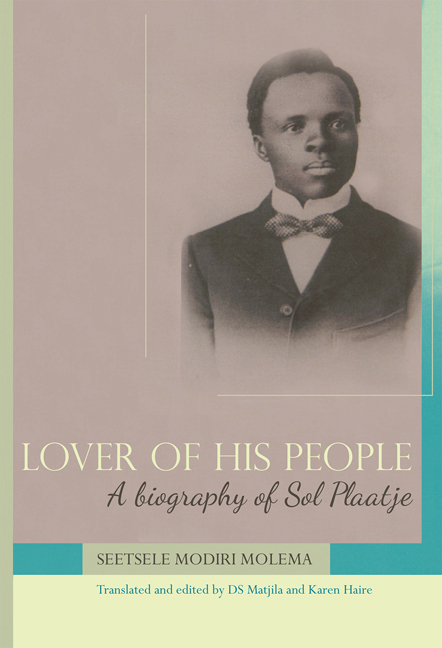Book contents
- Frontmatter
- Contents
- Acknowledgements
- Preface
- Foreword: Seetsele ModiriMolema: A star
- Chapter One First Encounter and Acquaintance
- Chapter Two Early Days and Youth
- Chapter Three An Unforgettable Year: 1896
- Chapter Four Life's Challenges
- Chapter Five Plaatje, The Career Journalist
- Chapter Six Government News
- Chapter Seven Conventions and Writings
- Chapter Eight Delegations and Meetings
- Chapter Nine Last Meetings and Travels
- Chapter Ten The Last Encounter
- Chapter Eleven Plaatje in His Own Words: English Extracts
- Chapter Twelve Plaatje in His Own Words: Setswana Extracts
- Seetsele Modiri Molema of the Mahikeng Molemas
- Bibliography
Chapter Seven - Conventions and Writings
Published online by Cambridge University Press: 16 March 2018
- Frontmatter
- Contents
- Acknowledgements
- Preface
- Foreword: Seetsele ModiriMolema: A star
- Chapter One First Encounter and Acquaintance
- Chapter Two Early Days and Youth
- Chapter Three An Unforgettable Year: 1896
- Chapter Four Life's Challenges
- Chapter Five Plaatje, The Career Journalist
- Chapter Six Government News
- Chapter Seven Conventions and Writings
- Chapter Eight Delegations and Meetings
- Chapter Nine Last Meetings and Travels
- Chapter Ten The Last Encounter
- Chapter Eleven Plaatje in His Own Words: English Extracts
- Chapter Twelve Plaatje in His Own Words: Setswana Extracts
- Seetsele Modiri Molema of the Mahikeng Molemas
- Bibliography
Summary
In August 1914, while the delegates were spreading the word and giving themselves to the work of garnering British public support for the South African struggle, World War I was declared. The date was 4 August 1914. This war spread fear like wildfire around the world and diverted the attention of those who had been listening to their pleas. As a result, the deputation returned to South Africa, except for Plaatje who remained behind in England and continued to address many white organisations, groups, and societies in London and other large towns across England and Scotland.
NATIVE LIFE IN SOUTH AFRICA BEFORE AND SINCE THE EUROPEAN WAR AND BOER REBELLION
At the same time, Plaatje had already begun writing a book that was to make him very famous, Native Life in South Africa. This book was inspired by the Natives’ Land Act. In it he chronicled the impact of the Act, showing the devastation wrought in the lives of the native people of South Africa.
This book was well received by international as well as national readers, who drank it in as a dry and thirsty land drinks in the rains. It was bought in the thousands. It was reprinted and again sold in the thousands. It was reprinted a third and even a fourth time and still it sold in the thousands. Today, forty-five years later, it is still being talked about as the authoritative explanation of, and report on, the effects of the diabolical Natives’ Land Act. On the inside leaf of the book, Native Life in South Africa, in one of the first editions printed, are the words: ‘To Modiri S Molema, with the author's compliments and happy memories of the days spent together under the siege of Mahikeng during the Boer War’. Sol T Plaatje, the author of the book, of course penned these words.
When Plaatje wrote this book he was in dire financial straits. Had it not been for the friendship of the Timberlakes in Leyton, Essex, I do not know what might have become of him. At the outset of World War I the price of board and lodging soared in England and Plaatje was left penniless. When he wrote home to Mahikeng, he was kindly assisted by Kgosi Lekoko Montshiwa and Silas Molema, who sent a little money.
- Type
- Chapter
- Information
- Lover of his PeopleA biography of Sol Plaatje, pp. 66 - 72Publisher: Wits University PressPrint publication year: 2013



